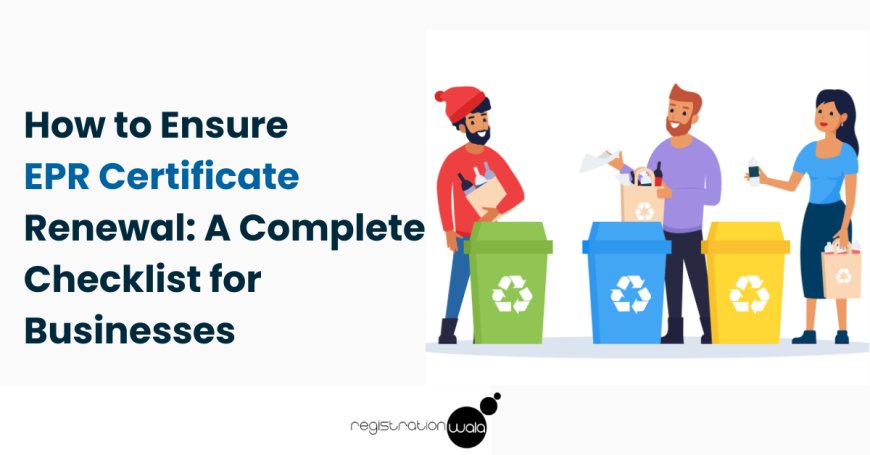How to Ensure EPR Certificate Renewal: A Complete Checklist for Businesses
Maintaining compliance with environmental regulations is crucial for businesses, especially those dealing with Extended Producer Responsibility (EPR). One key aspect of compliance is ensuring timely renewal of your EPR certificate. In this article, we’ll provide a complete checklist to help businesses renew their EPR certificate seamlessly.

Maintaining compliance with environmental regulations is crucial for businesses, especially those dealing with Extended Producer Responsibility (EPR). One key aspect of compliance is ensuring timely renewal of your EPR certificate. In this article, we’ll provide a complete checklist to help businesses renew their EPR certificate seamlessly.
Understanding the Importance of EPR Certificate Renewal
The EPR certificate is a legal requirement for businesses involved in the production, importation, and sale of goods, particularly electronic waste. Timely renewal of this certificate ensures that your business remains compliant with waste management regulations, avoiding penalties, and maintaining an eco-friendly operational framework.
Key Steps for EPR Certificate Renewal
To make the renewal process hassle-free, follow these essential steps:
1. Review Your Existing EPR Certificate
Before starting the renewal process, ensure that you have reviewed the details of your current certificate. Take note of the expiry date and assess if any changes in your business operations require updates in the renewal application.
2. Update Your Waste Collection Data
Ensure that all data on waste collection and recycling activities are up-to-date. Authorities will require detailed reports of how your business has complied with the waste management targets specified under your EPR obligations.
Make a checklist of the required documents for renewal, such as:
-
Annual compliance reports
-
Proof of waste disposal/recycling
-
Updated producer/importer registration details
-
Payment receipts for previous waste management services
4. Submit Renewal Application on Time
Late applications for EPR certificate renewal can lead to penalties or a temporary suspension of your operations. Mark your calendar and submit your renewal application well before the expiration date to avoid last-minute complications.
Common Mistakes to Avoid During EPR Certificate Renewal
Renewing your EPR certificate can be a smooth process if you avoid these common pitfalls:
Incomplete Documentation Ensure that all necessary documents are submitted. Missing paperwork can delay the renewal process.
Neglecting Updated Compliance Reports Businesses often fail to update their compliance reports regularly, which can result in penalties or rejection of the renewal application.
Ignoring Changes in Regulations Stay informed about any regulatory changes that may affect your renewal process, such as updated waste disposal targets or documentation requirements.
Conclusion
Renewing your EPR certificate is a crucial step for any business dealing with electronic or plastic waste. By following this checklist, you can ensure that the renewal process is smooth, timely, and compliant with all regulatory standards. Regularly reviewing your waste management practices, updating compliance reports, and staying informed about the latest regulations will help you maintain your EPR License without any issues.
Also Read: Top Benefits of Holding an EPR License for Manufacturers
